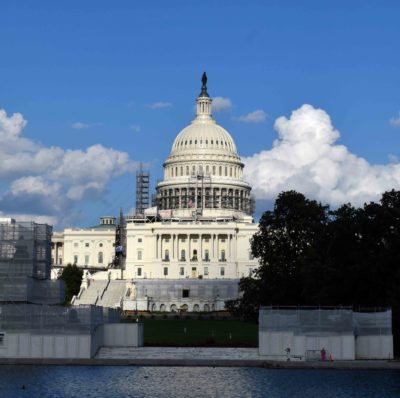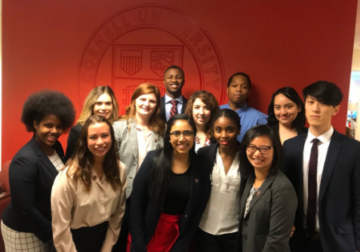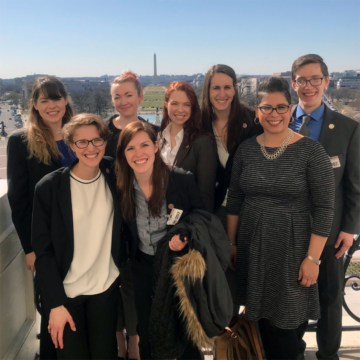AAAS CASE Workshop

The AAAS CASE Workshop is an exciting opportunity designed for doctoral students in science, technology, engineering, and math fields with limited experience and knowledge of science policy and advocacy who want to learn more about science policy.
The program is organized to educate STEM students who are interested in learning about the role of science in policy-making, to introduce them to the federal policy-making process and to empower them with ways to become a voice for basic research throughout their careers. Participants learn about the structure and organization of Congress, the federal budget and appropriations processes, and tools for effective science communication and civil engagement. In addition, students participate in interactive seminars about policy-making and communication.
Selected CASE participants join other Cornell doctoral and professional degree students for Advocacy Day activities and conduct meetings with elected Members of Congress and congressional staff. These meetings are organized by representatives from the Cornell Office of Federal Relations. In advance of Advocacy Day, there is an on-campus training led by representatives from the Cornell Office of Federal Relations to prepare participants for their Advocacy Day activities. Consideration is given to all doctoral students in STEM disciplines who are U.S. citizens or permanent residents.
Support for participation in the CASE Workshop comes from the Graduate School, Cornell Office of Federal Relations, and Careers Beyond Academia/BEST.
Organized by the American Association for the Advancement of Science for Catalyzing Advocacy in Science and Engineering
AAAS CASE Workshop March 24-27, 2019
The American Association for the Advancement of Science (AAAS) CASE Workshop took place March 24-27, 2019 in Washington, D.C.
Four Cornell students were selected to participate in the 2019 AAAS CASE cohort to learn how Congress works, how the federal budget is appropriated by Congress, and what tools are the most effective for science communication and civic engagement. In addition, they were involved in interactive sessions on policy-making and communication organized and run by the AAAS. Celine Cammarata, PhD candidate in Development Psychology, Marika Nell, PhD student in Chemical and Environmental Engineering, and Laura Harroff, PhD candidate in Biological and Environmental Engineering joined a Weill Medical grad student to take part.
On the last day of the program, participants formed teams to meet with their elected Members of Congress and congressional staff to go live, put into practice what they learned and advocate for university priorities along with 18 others selected to participate in Advocacy Day. Together they engaged in brief meetings with 25 offices from nine states and many more from their own home states, learning how to succinctly introduce themselves and quickly advocate for an issue relevant to the office. Madeleine Bee, PhD student in Food Science, Joseph Long, PhD student in Biomedical Engineering and Kate Harline, PhD student in Plant Biology joined many other Cornell participants to experience this immersion into a policy career environment and learn what a day in the life of a lobbyist could look like. With the expert mentoring of Cornell’s Kristen Liguori Adams, Associate Director of Federal Relations and seamless organization by Associate Dean Sara Xayarath Hernàndez and Alyssa Lopez from Cornell’s Graduate School Office of Inclusion and Student Engagement, the participants benefitted from the educational, strategic and logistic support provided.
As a special evening activity before the whirlwind meetings, Assistant Director at the US Government Accountability Office, and Cornell Club in Washington President Terry Horner ’92, PhD ’98 (Nutritional Sciences) met with the group to share his own illustrious career trajectory, opportunities in policy, and the importance of advocating to policymakers.
AAAS CASE Workshop March 18-21, 2018
The following participants were selected for the 2018 CASE workshop, congratulations!
- Lory Henderson, Microbiology
- Morgan Carter, Plant Pathology and Plant-Microbe Biology
- Manisha Munasinghe, Computational Biology
- Yolanda Lin, Civil and Environmental Engineering
AAAS CASE Workshop April 2-5, 2017
Sabrina Solouki (Immunology & Infectious Disease) was selected to represent Cornell University, along with Cat Sun (Natural Resources) at the prestigious AAAS CASE (American Association for the Advancement of Science Catalyzing Advocacy in Science and Engineering) Workshop April 2-5 in Washington, D.C.. The workshop provided an overview of the structure and organization of Congress, federal budget and appropriations processes, and provided tools and practice for effective science communication and civic engagement. On the last day, they joined others selected from Ithaca and Weill Cornell Medicine to participate in Advocacy Day, including Alicia Cintora (Materials Science & Engineering) and Celine Cammarata (Human Development).
All participants were primed on what and how to communicate with legislators, and how to represent issues important to Cornell University, by Kristen Adams, associate director of Cornell’s Office of Federal Relations. They then met with congressional representatives and staff members from their home districts in 12 states, in total covering 38 different offices on Capitol Hill.
“I was among a group of Cornell graduate and professional students who travelled to Washington DC to meet with lawmakers and advocate for continued support for advanced education. The trip was very impactful for me; not only did I meet other students interested in policy as well as professionals currently engaged in advocacy work, but I got to give it a spin myself! Meeting with lawmakers was empowering and exciting; it helped me realize how much scientists can contribute to policy and the many ways in which to do so.”-C. Cammarata
“The AAAS CASE workshop provided me with an insider perspective into the field of science policy, and went even further by discussing the fundamental ways in which the federal government operates. This hands-on workshop provided unique perspectives into science and technology policy, and taught me much more than I expected. Topics covered during the workshop included the structure of congress and its processes, an introduction into the white house office of science and technology policy, regulatory science policy from the standpoint of federal agencies (NIH, NSF, and US Geological Survey), a wonderful discussion about the federal budget process and how the appropriations process works, and ended with different fellowships and career opportunities that are available for graduate students. I would highly recommend this workshop for anyone interested in public engagement, science communication, or policy.
I would say the highlight of this workshop was the overall emphasis they placed on the need for scientists to enter policy positions, and the importance of evidence-based policy. During the second day of the workshop we heard from the house representative Bill Foster, one of the few congressional members with a PhD, who spoke about his transition to Congress and the importance of diversity among members and what it means for policy decisions. His speech, along with our congressional visits, which occurred the next day, was truly enlightening and a great experience. Hearing from Dr. Foster and then advocating first-hand about science/research was very rewarding and a great way to learn more about policy and engagement.”- S. Solouki
“Being a part of Advocacy Day was a great experience, because I was able to learn more about the real impact that government can have on the financial stability of university for its graduate students. I learned that it is important to be vocal about the continuation of financial aid at all grade levels to ensure students have as many opportunities as possible to explore. It was also great to meet other graduate students who are looking into similar career paths as I am.“-A. Cintora
AAAS CASE Workshop April 17-19, 2016
Doctoral students Charlotte Levy, Ecology and Evolutionary Biology and Steve Halaby, Molecular Biology and Genetics, were selected to represent Cornell as one of over 50 institutions nationwide who participated in the AAAS Making our CASE Workshop held in Washington, DC, from April 17-19, 2016. They joined a dozen Cornellians in Washington D.C. for Hill visits the following day (see the “Cornell graduate students march on Washington” Chronicle article here).
The two and a half-day CASE workshop, organized by the Office of Government Relations at the American Association for the Advancement of Science (AAAS), provided participants with a wonderful introduction to science and public policy. The speakers they met represent a broad range of backgrounds and experiences, and each has their own unique story as to what brought them to the intersection of science and public policy.
Candidates were selected at Cornell for nomination to the AAAS workshop for their interest in science policy and advocacy, strong leadership skills, and exemplary communication skills. Steve Halaby does research in the Fromme lab at the Institute of Cellular and Molecular Biology. He also serves as a Graduate Student Ambassador by assisting with recruiting strong applicants and welcoming them once admitted. The outreach program encourages a diverse student body and helps with retention. “We need science heroes,” Halaby states.
Charlotte Levy works in the Goodale and Fahey labs and her research revolves around the global carbon cycle, focusing specifically on decomposition rates following chronic nitrogen addition, and carbon offsets from forest management and woody biofuels. She recently became the incoming President of the Advancing Science And Policy graduate club to better advocate for science and train graduate students and postdocs for increased skills and practical opportunities in policymaking and in communicating their research.
To prepare for the AAAS Catalyzing Advocacy in Science and Engineering (CASE) workshop, participants reviewed the R&D Budget, as one of the activities at the workshop involved breaking into teams to actually work on the Commerce, Justice, and Science appropriations. This was a unique opportunity for participants to play the role of a congressional staffer. In addition, the workshop included a session on effective communication and opportunities to strategize and practice. Workshop materials included potential talking points and resource material that students utilized in crafting a message for a meeting.
The third day of the Workshop was organized by the Cornell Federal Relations office and provided an opportunity for students to visit with Members of Congress and their staff to put into practice some of the skills they learned the previous two days.
This spotlight is from the time period of the NIH grant (Sept. 2013- Jun. 2019) to the Cornell BEST Program now housed in the Graduate School as a university-wide initiative “Careers Beyond Academia” to encompass all disciplines. Names marked in bold represent active participants in the Cornell BEST Program during the grant period.



